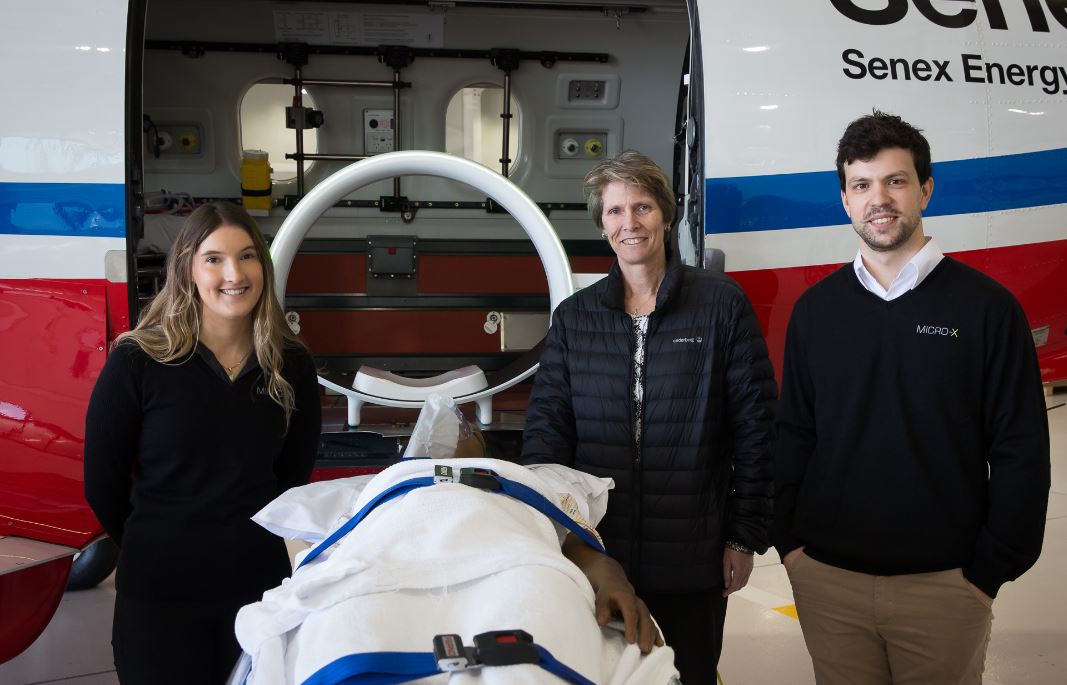
An innovative approach to mobile diagnosis of stroke is taking off, and helping Flinders University students on their way too.
Australian Stock Exchange-listed local company Micro-X, which is based at the Tonsley Innovation District, is developing a small CT brain scanner that can be fitted in ambulances and emergency aircraft.
If successful, the device will allow paramedics and retrieval teams to diagnose and then start treating stroke patients in the golden hour – the first hour after a stroke.
The miniature brain CT imager for pre-hospital stroke diagnosis is being developed with funding from the Australian Government’s Medical Research Future Fund.
Under the Frontier Health and Medical Research Initiative, the Micro-X invention will receive $8 million in funding from the Australian Stroke Alliance to progress the scanner towards patient imaging trials in 2023.
This year, stroke will affect more than 15 million people worldwide – 5 million will die and another 5 million will be permanently disabled. In Australia, there are about 38,000 stroke events annually, or more than 100 a day, says Professor Stephen Davis from the Australian Stroke Alliance.
“Detecting and starting treatment within that timeframe gives patients a much better chance of surviving and recovering with limited brain damage,” he says.
Compared to very expensive conventional custom-built CT scanner equipment and specialist on-board acute stroke personnel, the compact and more affordable Micro-X’s technology has the potential to turn every ambulance into a stroke capable ambulance.
“We have invented an electronic X-ray tube which is already in use in mobile X-ray units in hospital emergency and ICU rooms,” says Micro-X managing director Peter Rowland.
“We will create a small arc using a number of these patented X-ray tubes, and a curved detector developed in partnership with Fujifilm, to create a compact and robust CT scanner with no moving parts that could be installed in every ambulance,” he says.
The project is made possible thanks to Micro-X’s carbon nanotube (CNT) emitter technology, with Micro-X successfully completing initial imaging studies with the Melbourne Brain Centre.
Flinders University graduates, now working at Micro-X, have worked on the company’s new products and device technologies, and Honours interns Mia Maric and Thomas McSkimming, pictured with Flinders University Professor Karen Reynolds, have worked closely on the scanner project.
The new Micro-X CT brain scanner project grant is also funding Thomas McSkimming – Bachelor of Biomedical Engineering (Honours)/Bachelor of Software Engineering (Honours) – to carry out his PhD studies in conjunction with the world-leading Johns Hopkins University in Baltimore, US.
Professor Reynolds, director of the Medical Device Research Institute at Flinders University, and Associate Professor Egon Perilli are his PhD co-supervisors.
The scanner project is collaborating with Fujifilm, the John Hopkins University, as well as the MADA Monash University Health team and the Melbourne Brain Centre at the Royal Melbourne Hospital.
The technology was demonstrated at Adelaide Airport for the Royal Flying Doctor Service and other industry partners last month.

